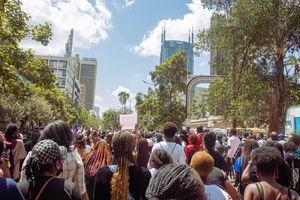
From left: Vivian Kajaya, Eileen Cherotich, Seth Nyakio and Rita Waeni.
Out of the 446 Kenyans murdered in 2024, 219 were either hacked to death or stabbed, painting a grim picture of how people resorted to extreme violence throughout the year.
Data shows that 139 people were hacked, while 80 others were stabbed, according to a Nation research based on media reports between January 1 and 25 November. Official statistics indicate that by October 30, 339 murders had been recorded, a slight increase from 336 in 2023 during the same period.
Data from the Kenya National Bureau of Statistics (KNBS) shows that 860 murder cases were brought before the courts in 2023, with 526 resulting in convictions.
In the cases reported this year, the manner in which victims met their deaths is not only shocking but also disturbing.
The gruesome murders of Rita Waeni and Starlet Wahu in January were perhaps a foreshadowing of how much worse things would get as the year progressed. Perpetrators resorted to using knives, machetes, pangas, and other sharp objects to attack victims, many of whom were intentionally murdered.
One such perpetrator is Evans Kosgei, who killed his wife, Jackline Jemutai, in March. Mr Kosgei posted on X (formerly Twitter) about his plans to end Ms Jemutai’s life over what he termed as betrayal.
In his many posts, he narrated how they met and the growth of their relationship, including the fact that they had a child.
He also accused Ms Jemutai, a teacher at a school in Nyeri, of cheating on him. But even more brazen were his tweets, where he tagged the DCI, writing, “If by any chance something happens, then know what was happening behind the scenes,” following a long thread in which he detailed how his relationship with Ms Jemutai had gone from high school sweethearts to estranged lovers.
He then went on to kill her by hacking her to death and posted about it afterwards. As police were trailing him, their search ended in Thika, where he had died by suicide. In a note he left behind, he revealed that he was responsible for the murder.
Other killers used more than one method to end the lives of their victims, with some of the victims being subjected to rape, assault, or strangulation in addition to hacking.
In a year where cases of femicide led to protests in the streets, 13 women were raped and eight girls defiled before they were killed, as highlighted in the media.
Method of killing
Prime Cabinet Secretary Musalia Mudavadi, while giving an update on the country’s security situation on 19 December, said that 7,107 Sexual and Gender-Based Violence (SGBV) cases had been reported since September 2023. Assault was another method of killing, claiming the lives of 94 people across the country.
Post-mortem reports showed that many of them died after being hit with blunt objects, others were beaten with sticks and other crude weapons, while some were killed in physical fights.
Strangulation claimed the lives of 22 people, and 32 people were shot, many of them by security forces, while six were burnt to death.
One victim of strangulation was 68-year-old Wilkister Odanga, a deaf widow who lived alone in her house in Homa Bay County. She was strangled by an unknown person on the night of 12 August. Her murder revealed just how vulnerable elderly people, and especially women who live in solitude, are. The motive for her death remains unknown, as nothing was stolen from her house.
Motives for murder
Ms Odanga’s case reflects the 234 cases recorded where the motive for the murder remained unknown. Another 41 cases were linked to robbery incidents, while domestic disputes —including disputes between relatives or intimate partners — were the motive for 40 murders.
Other motives included land disputes, which accounted for 16 cases, while love triangle disputes led to the deaths of 15 people. Physical fights, in which most victims were male, accounted for 20 deaths, and accusations of cheating among intimate partners resulted in six deaths.
Bizarre cases
Among the motives were some bizarre cases, including two instances where women killed their children in order to marry their new lovers, as they had not sired those children with them. Four children died under such circumstances.
In Kericho, Brenda Cheptoo killed her two children, aged six and eight, and buried them in a shallow grave. In Bomet, Vicky Chirchir and her new lover allegedly killed her two girls, aged 12 and nine, because they had not sired them together.
Another case of parents killing their children occurred in Nyandarua, where a mother beat her six-year-old son to death after he broke a television set at home.
In Kwale, another mother beat her seven-year-old daughter to death with a chapati roller.
Even more bizarre was the death of Gracio Ogulo, who was allegedly killed by his brother, James Ocharo, in Busia after a disagreement over how to share meat at the funeral of their relative.
The two argued over who would carry the liver of the animal they had slaughtered. Mr Ocharo was later lynched by an angry crowd for killing his brother.
A fight over hanging lines between two women in Riruta, Kiambu County, left Stellah Syokau, 42, dead, while a father stabbed his 25-year-old daughter after a quarrel over a solar lamp.
Unsafe counties
Nairobi is the most dangerous place to live, according to recorded murder cases, with 72 cases reported in the city county, followed by Nakuru with 32, Kiambu with 29, Meru with 22, and Murang’a with 20 cases.
Counties with the least reported cases include Baringo, Garissa, Laikipia, Makueni, and Vihiga, each with five cases. Bungoma and Nyandarua each had four cases, while Migori, Tana River, and Tharaka Nithi reported three each. Elgeyo Marakwet, Isiolo, Mombasa, Nandi, Taita Taveta, and Turkana had two murder cases each. Lamu, Marsabit, Wajir, and West Pokot recorded one case each.
There were no media reports on any cases from Mandera and Samburu. However, it is important to note that our data is based on media reports, which may mean that some cases went unreported due to lack of media coverage, particularly in remote areas.
Perpetrators
One in seven murders were committed by an intimate partner, with husbands responsible for 28 deaths, highlighting how the home has become one of the most dangerous places for women.
Boyfriends were responsible for 19 deaths, while wives and girlfriends were responsible for eight and two deaths, respectively, according to Nation analysis of media reports.
Velji Jayaben Jayeshi Kumar is one such wife suspected of hiring people to “discipline her husband.” Those contracted to execute the task ended up killing him. The case is ongoing in court.
Another case involves Linet Odhiambo, who allegedly stabbed her husband five times in the stomach after a dispute. Neighbours reported hearing screams from their home in Bulapesa, Isiolo County, and when police responded, they found him in bed with severe injuries, which he later succumbed to.
A report by UN Women shows that there were an estimated 21,700 victims of intimate partner and family-related femicide in Africa alone in 2023. Globally, 51,000 women and girls were killed by their intimate partners or other family members, an increase from 48,800 in 2022.
Forty-five per cent of perpetrators of femicide globally were intimate partners, with at least 140 women and girls losing their lives every.
Other perpetrators of murder, according to the data, were parents, who accounted for 35 cases, and children who killed their parents, with 10 cases. Relatives were responsible for 18 cases.
In cases where the perpetrators were known, 186 were male, while 27 were female. KNBS data shows that in 2023, 1,901 people were arrested for murder, of whom 1,721 were male and 180 were female.
Another 55 men and six women were arrested for manslaughter, while 346 people were arrested for causing death by dangerous driving. Of these, 305 were male and 41 were female.
Despite calls for further efforts into investigations, many cases remain unsolved and suspects at large. The family of Ms Odanga is skeptical that they will be accorded justice for her loss.Mr Ben Otieno, one of the sons of the deceased, told Nation that the family is not getting convincing answers from police.
Age and Gender of victims
The Nation research shows that of the 435 people killed whose gender was known, 263 were male while 172 were female. Mr Mudavadi put the number of women murdered between August and November at 100 while in October, Deputy Inspector General of Police Eliud Lagat had said that the number of femicide cases between August and October 30 was 97.
Young people were the highest victims with one in every five aged between 20 and 29 years. Some of the cases that attracted a lot of interest were those of university students murdered with 12 cases being highlighted in the media.
Additional reporting by George Odiwuor









